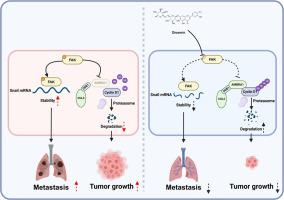地奥司明通过靶向 FAK 降低蜗牛和细胞周期蛋白 D1 的稳定性,从而抑制 NSCLC 的进展
IF 8.3
1区 医学
Q1 CHEMISTRY, MEDICINAL
引用次数: 0
摘要
背景在不同的肿瘤中,非受体酪氨酸激酶--局灶粘附激酶(FAK)会上调,因此它是一个很有希望的癌症治疗靶点。然而,FAK 激酶抑制剂的开发面临着许多挑战。方法通过分子对接确定了靶向FAK的小分子,并通过表面等离子体共振(SPR)和细胞热转移分析进行了验证。我们使用 CCK-8、菌落形成、EdU、Transwell 试验和细胞周期分析法研究了 FAK 激酶抑制剂的药理作用。结果我们证实了地奥司明(Dio)是一种 FAK 抑制剂,并证明了它在肺腺癌中的抗增殖和抗转移作用。从机理上讲,Dio 通过抑制 FAK 的催化活性来抑制肿瘤的增殖和转移。Dio激活泛素蛋白酶体途径,诱导细胞周期蛋白D1降解,同时抑制肿瘤增殖,并通过降低蜗牛的mRNA稳定性逆转上皮间质转化(EMT)过程,从而抑制癌症转移。此外,Dio 对肺腺癌的抑制作用还在小鼠异种移植模型中得到了验证。本文章由计算机程序翻译,如有差异,请以英文原文为准。

Diosmin reduces the stability of Snail and Cyclin D1 by targeting FAK to inhibit NSCLC progression
Background
In different tumours, focal adhesion kinase (FAK), a nonreceptor tyrosine kinase, is upregulated and hence, it represents a promising target for cancer therapy. However, the development of FAK kinase inhibitors has faced a number of challenges. It is therefore imperative that new, effective FAK kinase inhibitors be identified promptly.
Methods
Small molecules that target FAK were identified through molecular docking and validated through surface plasmon resonance (SPR) and cell thermal shift analysis. We investigated the pharmacological effects of FAK kinase inhibitors using CCK-8, colony formation, EdU, and Transwell assays and cell cycle analysis. The molecular mechanism was determined via methods such as coimmunoprecipitation, RNA pull-down and RNA immunoprecipitation.
Results
Here, we confirmed that diosmin (Dio) is an inhibitor of FAK and demonstrated its anti-proliferative and anti-metastatic effects in lung adenocarcinoma. Mechanistically, Dio inhibited tumour proliferation and metastasis by impeding the catalytic activity of FAK. Dio activated the ubiquitin proteasome pathway to induce Cyclin D1 degradation, while inhibiting tumour proliferation and reversing the epithelial mesenchymal transition (EMT) process by reducing the mRNA stability of Snail, thereby inhibiting cancer metastasis. In addition, the inhibitory effect of Dio on lung adenocarcinoma was validated in a mouse xenograft model.
Conclusion
These results support the tumour-promoting role of FAK in lung adenocarcinoma by stabilizing Cyclin D1 and Snail and suggest that Dio is a promising candidate for FAK inhibition.
求助全文
通过发布文献求助,成功后即可免费获取论文全文。
去求助
来源期刊

Phytomedicine
医学-药学
CiteScore
10.30
自引率
5.10%
发文量
670
审稿时长
91 days
期刊介绍:
Phytomedicine is a therapy-oriented journal that publishes innovative studies on the efficacy, safety, quality, and mechanisms of action of specified plant extracts, phytopharmaceuticals, and their isolated constituents. This includes clinical, pharmacological, pharmacokinetic, and toxicological studies of herbal medicinal products, preparations, and purified compounds with defined and consistent quality, ensuring reproducible pharmacological activity. Founded in 1994, Phytomedicine aims to focus and stimulate research in this field and establish internationally accepted scientific standards for pharmacological studies, proof of clinical efficacy, and safety of phytomedicines.
 求助内容:
求助内容: 应助结果提醒方式:
应助结果提醒方式:


